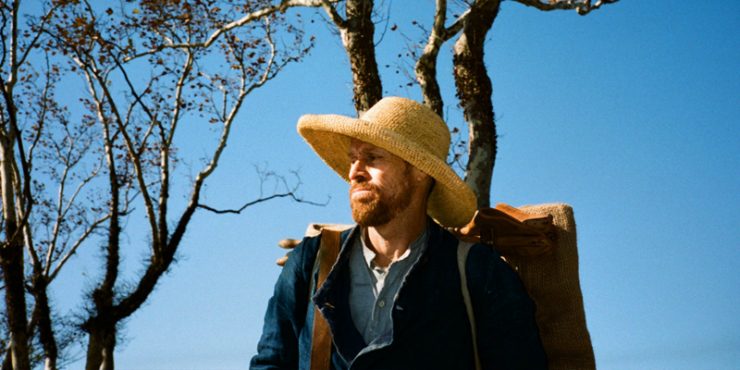It’s fascinating to me that a director as distinct as Julian Schnabel always finds himself making biopics, one of cinemas most traditional genres. With At Eternity’s Gate, Schnabel tells the story of Vincent van Gogh, with Willem Dafoe playing the famously tortured artist. Schnabel focuses on the last moments of van Gogh’s life and career, a period plagued by rejection, professional failure and mental illness. From a script by Schnabel, Louise Kugelberg and Jean-Claude Carriere, At Eternity’s Gate has a difficult time with its narrative, particularly as Schnabel constantly undermines it with disorienting cinematography (the film is shot by Benoit Delhomme) and looping dialogue. This is perhaps meant to display the madness in van Gogh’s mind, but instead creates a film that is ultimately sloppy, and the ways in which it attempts to elicit visceral responses doesn’t always feel earned.
Schnabel is still talented enough to fall into numerous beautiful images, not only from van Gogh’s paintings but also from the setting, going to the actual locations where van Gogh lived in the South of France. Dafoe is a deft enough performer to pull off the mix of ferocity and vulnerability that is van Gogh, but Schnabel so often edits his film into Malleck-ian obscurity, pushing At Eternity’s Gate into a mood piece, that ultimately transforms into another story that romanticizes the links between illness and artistry. Last year’s Loving Vincent was another uneven film about van Gogh, but that film was creative in its storytelling – it crafted a murder mystery out of the artist’s paintings. Schnabel is trying to craft a narrative around van Gogh’s mind, something he can only presume to have access to. The presumption leaves his film dangling at times between evocative imagery and pretension, and it’s too often the latter.
Directed by Julian Schnabel










